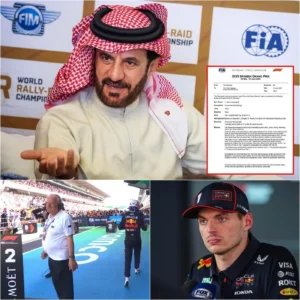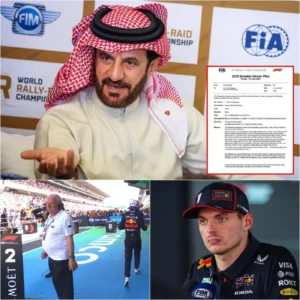In the world of Formula 1, controversies and heated debates are as common as the roaring engines on race day. The recent incident involving Max Verstappen during the 2024 Singapore Grand Prix has reignited discussions about racing ethics and penalties. Notably, former driver and racing analyst Danica Patrick has stepped up to defend Verstappen, arguing that he should not face penalties for his actions. Patrick’s stance draws a stark contrast to previous claims made against Lewis Hamilton, where allegations of cheating were far more pronounced. This article delves into Patrick’s defense of Verstappen, the context of the incident, and the broader implications for Formula 1.

During the 2024 Singapore Grand Prix, Max Verstappen was involved in a controversial maneuver that raised eyebrows among fans and analysts alike. Many were quick to point out potential infractions, speculating about possible penalties. However, Patrick argues that Verstappen’s actions were within the bounds of competitive racing, emphasizing the importance of allowing drivers to push their limits.
Patrick highlights that racing is inherently a high-stakes environment where split-second decisions can lead to unintended consequences. In her view, Verstappen’s move did not exhibit the level of reckless behavior that warrants penalization. Instead, she believes it showcased his skill and determination to win—qualities that are crucial in the fiercely competitive world of Formula 1.
Danica Patrick, a pioneer in motorsport and a respected voice in racing analysis, offers a unique perspective on the issue. Having competed at the highest levels of racing, she understands the pressures drivers face on the track. In a recent interview, she stated, “Racing is about pushing boundaries. Max’s actions in Singapore were not out of line for what we expect from top-tier drivers.”
Patrick’s defense contrasts sharply with how past incidents involving Lewis Hamilton were handled. In 2021, Hamilton faced severe scrutiny and allegations of cheating following a controversial incident. Many argued that his actions compromised the integrity of the sport. The differences in how these situations are perceived highlight the need for a consistent approach to penalties in Formula 1.

The disparity between Verstappen’s current situation and Hamilton’s past controversies raises important questions about fairness in racing. Critics argue that the FIA (Fédération Internationale de l’Automobile) has applied inconsistent standards when dealing with infractions. Patrick emphasizes that the governing body must strive for uniformity in its decision-making processes to maintain the integrity of the sport.
“Formula 1 is a game of perception as much as it is about speed,” Patrick notes. “If we want to uphold the integrity of racing, we must ensure that penalties are applied consistently across the board. Otherwise, we risk undermining the credibility of the sport itself.”
Media narratives play a crucial role in shaping public perception of drivers and incidents. In Verstappen’s case, the immediate backlash following the Singapore GP incident demonstrates how quickly opinions can form based on limited information. Patrick urges fans and commentators alike to approach such situations with a critical eye, avoiding knee-jerk reactions.
“Before jumping to conclusions, it’s essential to analyze the context and the motivations behind a driver’s actions,” she says. “Max is a fierce competitor, and while emotions run high during a race, we must remember that everyone on that track is doing their best.”
While both Max Verstappen and Lewis Hamilton are undeniably talented drivers, their careers have unfolded in distinctly different environments. Hamilton, a seven-time world champion, has often found himself at the center of controversies, with allegations of cheating casting a shadow over his achievements. In contrast, Verstappen’s racing style has often been described as aggressive but strategic, leading to fewer incidents that draw the same level of scrutiny.
This difference in perception may also stem from the evolving nature of Formula 1 itself. As the sport has progressed, so too have the expectations placed on drivers. What was once considered acceptable behavior may now be scrutinized more closely, making it essential for drivers to adapt their strategies accordingly.
As the 2024 Formula 1 season progresses, the discussions surrounding penalties and driver behavior will undoubtedly continue. Patrick’s defense of Verstappen highlights the need for a more nuanced approach to penalties—one that considers the context of each incident rather than applying blanket judgments.

The FIA must carefully evaluate its policies to ensure that all drivers are held to the same standards, fostering an environment of fair competition. Additionally, the influence of media narratives on public perception necessitates a shift towards more balanced reporting that considers the complexities of racing dynamics.
Danica Patrick’s defense of Max Verstappen following the Singapore GP incident underscores the importance of context in evaluating driver behavior. While the allure of penalties and controversies will always be part of Formula 1, it is essential for stakeholders to approach these situations with a commitment to fairness and consistency. As the sport continues to evolve, maintaining the integrity of racing should be the top priority for all involved. Only then can Formula 1 thrive as a true competition of skill, strategy, and sportsmanship.
In the end, the ongoing debate serves as a reminder that racing is not just about speed; it is also about the values that underpin the sport. The lessons learned from Verstappen’s defense and Hamilton’s past will shape the future of Formula 1, guiding the next generation of drivers toward a more equitable racing landscape.






